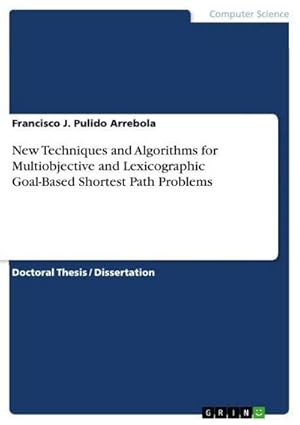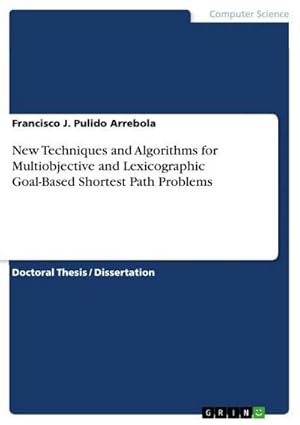New Techniques Algorithms Multiobjective by Pulido Arrebola (2 results)
Product Type
- All Product Types
- Books (2)
- Magazines & Periodicals
- Comics
- Sheet Music
- Art, Prints & Posters
- Photographs
- Maps
-
Manuscripts &
Paper Collectibles
Condition
- All Conditions
- New
- Used
Binding
- All Bindings
- Hardcover
- Softcover
Collectible Attributes
- First Edition
- Signed
- Dust Jacket
- Seller-Supplied Images
- Not Printed On Demand (1)
Seller Location
Seller Rating
-
New Techniques and Algorithms for Multiobjective and Lexicographic Goal-Based Shortest Path Problems
Published by GRIN Verlag Feb 2016, 2016
ISBN 10: 3668132496ISBN 13: 9783668132498
Seller: BuchWeltWeit Ludwig Meier e.K., Bergisch Gladbach, Germany
Book Print on Demand
Taschenbuch. Condition: Neu. This item is printed on demand - it takes 3-4 days longer - Neuware -Doctoral Thesis / Dissertation from the year 2015 in the subject Computer Science - Miscellaneous, University of Málaga (University of Málaga), language: English, abstract: Shortest Path Problems (SPP) are one of the most extensively studied problems in the fields of Artificial Intelligence (AI) and Operations Research (OR). It consists in finding the shortest path between two given nodes in a graph such that the sum of the weights of its constituent arcs is minimized. However, real life problems frequently involve the consideration of multiple, and often conflicting, criteria. When multiple objectives must be simultaneously optimized, the concept of a single optimal solution is no longer valid. Instead, a set of efficient or Pareto-optimal solutions define the optimal trade-off between the objectives under consideration.The Multicriteria Search Problem (MSP), or Multiobjective Shortest Path Problem, is the natural extension to the SPP when more than one criterion are considered. The MSP is computationally harder than the single objective one. The number of label expansions can grow exponentially with solution depth, even for the two objective case. However, with the assumption of bounded integer costs and a fixed number of objectives the problem becomes tractable for polynomially sized graphs.Goal programming is one of the most successful Multicriteria Decision Making (MCDM) techniques used in Multicriteria Optimization. In this thesis we explore one of its variants in the MSP. Thus, we aim to solve the Multicriteria Search Problem with lexicographic goal-based preferences. To do so, we build on previous work on algorithm NAMOA , a successful extension of the A algorithm to the multiobjective case. More precisely, we provide a new algorithm called LEXGO , an exact label-setting algorithm that returns the subset of Pareto optimal paths that satisfy a set of lexicographic goals, or the subset that minimizes deviation from goals if these cannot be fully satisfied. Moreover, LEXGO is proved to be admissible and expands only a subset of the labels expanded by an optimal algorithm like NAMOA , which performs a full Multiobjective Search.This thesis proposes a new technique called t-discarding to speed up dominance checks in the process of discarding new alternatives during the search. The application of t-discarding to the algorithms studied previously, NAMOA and LEXGO , leads to the introduction of two new time-efficient algorithms named NAMOA dr and LEXGO dr, respectively. All the algorithmic alternatives are tested in two scenarios, random grids and realistic road maps problems. 196 pp. Englisch.
-
New Techniques and Algorithms for Multiobjective and Lexicographic Goal-Based Shortest Path Problems
Published by GRIN Verlag, 2016
ISBN 10: 3668132496ISBN 13: 9783668132498
Seller: AHA-BUCH GmbH, Einbeck, Germany
Book
Taschenbuch. Condition: Neu. Druck auf Anfrage Neuware - Printed after ordering - Doctoral Thesis / Dissertation from the year 2015 in the subject Computer Science - Miscellaneous, University of Málaga (University of Málaga), language: English, abstract: Shortest Path Problems (SPP) are one of the most extensively studied problems in the fields of Artificial Intelligence (AI) and Operations Research (OR). It consists in finding the shortest path between two given nodes in a graph such that the sum of the weights of its constituent arcs is minimized. However, real life problems frequently involve the consideration of multiple, and often conflicting, criteria. When multiple objectives must be simultaneously optimized, the concept of a single optimal solution is no longer valid. Instead, a set of efficient or Pareto-optimal solutions define the optimal trade-off between the objectives under consideration.The Multicriteria Search Problem (MSP), or Multiobjective Shortest Path Problem, is the natural extension to the SPP when more than one criterion are considered. The MSP is computationally harder than the single objective one. The number of label expansions can grow exponentially with solution depth, even for the two objective case. However, with the assumption of bounded integer costs and a fixed number of objectives the problem becomes tractable for polynomially sized graphs.Goal programming is one of the most successful Multicriteria Decision Making (MCDM) techniques used in Multicriteria Optimization. In this thesis we explore one of its variants in the MSP. Thus, we aim to solve the Multicriteria Search Problem with lexicographic goal-based preferences. To do so, we build on previous work on algorithm NAMOA , a successful extension of the A algorithm to the multiobjective case. More precisely, we provide a new algorithm called LEXGO , an exact label-setting algorithm that returns the subset of Pareto optimal paths that satisfy a set of lexicographic goals, or the subset that minimizes deviation from goals if these cannot be fully satisfied. Moreover, LEXGO is proved to be admissible and expands only a subset of the labels expanded by an optimal algorithm like NAMOA , which performs a full Multiobjective Search.This thesis proposes a new technique called t-discarding to speed up dominance checks in the process of discarding new alternatives during the search. The application of t-discarding to the algorithms studied previously, NAMOA and LEXGO , leads to the introduction of two new time-efficient algorithms named NAMOA dr and LEXGO dr, respectively. All the algorithmic alternatives are tested in two scenarios, random grids and realistic road maps problems.



